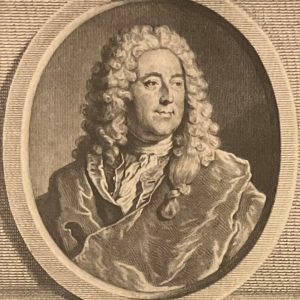calsfoundation@cals.org
John Law’s Concession
aka: John Law's Colony
aka: Mississippi Bubble
John Law’s concession was established in August 1721 and was located at Little Prairie, just over twenty-six miles from the mouth of the Arkansas River, in present-day Arkansas County. The colony was located near the Quapaw city of Kappa. Its failure slowed the growth of Arkansas as a European colony, although settlers continued to live at Arkansas Post throughout the eighteenth century.
By the summer of 1686, Arkansas Post was already an important French trading post between New Orleans, Louisiana, and Illinois, but no serious efforts were made to settle the land. The French government realized that, to compete with colonial Great Britain, it would need to establish profitable colonies.
John Law, a Scotsman, was an economist and banker who was also known for his gambling and dueling. Banned from more than one European nation, he ended up in France and received a government post with the hope that he could pull the French empire out of debt. Law created a private national bank and began issuing paper money based on the wealth the French government hoped to acquire from colonies in America. After the plan’s initial success in 1717, Law’s Compagnie d’Occident was given a twenty-five-year charter to manage and settle the Louisiana Territory for France in exchange for exclusive trading rights to the area. Law agreed to settle 6,000 colonists and 300 slaves in the territory and set aside a twelve-square-mile concession for himself near Henri de Tonti’s abandoned trading post. Had Law’s plan not failed, this settlement would have become the Duchy of Arkansas, with Law as duke.
Law was convinced that Louisiana would be rich with natural resources that would make the French government wealthy. To attract settlers, Law advertised gold and precious stones he said would be found in Arkansas, and his company spread rumors about the wealth of the Louisiana area. Stock in Law’s company quickly increased, though few were eager to leave France to settle in Louisiana. Law recruited prisoners and bought slaves to send to the colony himself. To populate his own concession, Law personally paid the expenses of 200 German families, though they never reached the settlement, choosing instead to settle closer to New Orleans after later hearing of Law’s bankruptcy.
Law’s personal concession was established in August 1721 by a group of about eighty indentured servants, skilled workmen, and craftsmen, and it included a garrison established at the old trading post to protect the settlers. Jacques Levens was appointed by Law to manage the concession and prepare for future colonists. For the first year, the settlers were plagued by rains and flooding that made clearing and farming land difficult.
Law quickly became the most powerful man in France, but the national bank was issuing paper money on credit, and eventually the “Mississippi Bubble” burst, causing hundreds to lose their life savings, while Law fled France in 1720. Moving again from city to city (including Brussels, Rome, Copenhagen, and London), he eventually died in Venice in 1729. After the dissolution of the Compagnie d’Occident, plans to colonize Louisiana were put on hold, and the settlers already there either returned to their homeland or stayed to try and survive on their own.
When the expedition of Jean-Baptiste Bénard de La Harpe reached the Law concession on March 1, 1722, it found fewer than fifty settlers and only a handful of buildings. Only three acres of the concession had been cleared, and if not for relief boats sent from New Orleans, the colonists would have starved. La Harpe traded with the Indians for supplies for the settlers, forcing him to cut his expedition short and return to Illinois. In February 1723, company inspector Diron d’Artaguiette made an official visit to the colony and reported even fewer settlers, who were still struggling to raise their own crops.
After Law’s bankruptcy, his personal concession was returned to the crown, and Bertrand Dufresne du Demaine became director of the Arkansas colony. Some of the indentured servants from the colony stayed behind to become hunters and traders, settling in the Lake Dumond area. In 1725, the military post was abandoned, and Governor Jean-Baptiste Le Moyne de Bienville of the Louisiana Territory ordered the evacuation of all but eight men, who stayed behind to maintain the French alliance with the Quapaw.
For additional information:
Arnold, Morris. Colonial Arkansas, 1686–1804. Fayetteville: University of Arkansas Press, 1991.
———. Unequal Laws unto a Savage Race: European Legal Traditions in Arkansas, 1686–1836. Fayetteville: University of Arkansas Press, 1985.
Davis, Clyde. The Arkansas. New York: Rinehart, 1940.
Coleman, Roger. The Arkansas Post Story. Santa Fe: Southwest Cultural Resources Center, 1987.
Gleeson, Janet. Millionaire: The Philanderer, Gambler, and Duelist Who Invented Modern Finance. New York: Simon and Schuster, 1999.
Rice, Melinda Carolyn. “A Fool and His Money: Culture and Financial Choice during the John Law Affair of 1720.” PhD diss., University of California, Los Angeles, 2007.
Caty Henderson
Ward, Arkansas
Staff of the CALS Encyclopedia of Arkansas







Comments
No comments on this entry yet.